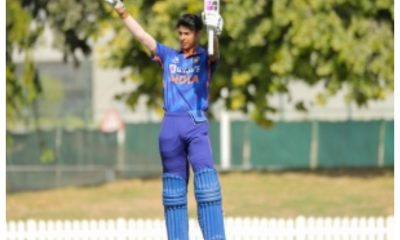International
U-19 World Cup: All-round India outclass England; clinch record-extending 5th title
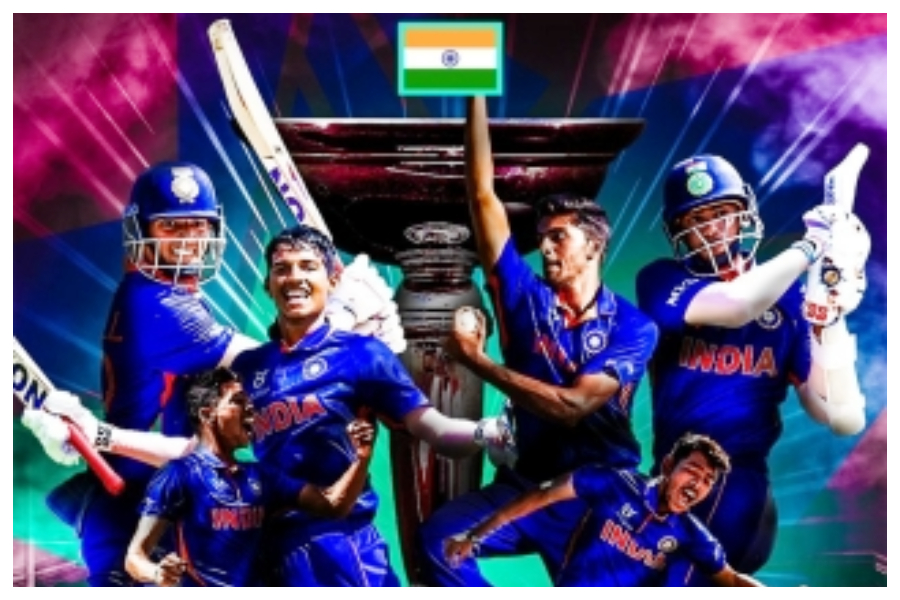
Riding on half-centuries by Nishant Sindhu and Shaik Rasheed and clinical bowling performances from Raj Bawa and Ravi Kumar, India clinched a record-extending 5th U-19 World Cup title after beating England by four wickets in the final of the 2022 edition of the tournament at the Sir Vivian Richards Stadium, here on Saturday.
This is India’s record fifth title in the tournament’s history and came after previously winning it in 2000, 2008, 2012 and 2018. The Yash Dhull-led India U19 finished the tournament with an unbeaten run in the West Indies, flaunting the strength of the assembly line of Next-Gen India cricketers.
With this, Dhull joins the illustrious list of captains — Mohammad Kaif (2000), Virat Kohli (2008), Unmukt Chand (2012), Prithvi Shaw (2018) — who have lifted the U19 trophy for India in the past.
A superb bowling performance by Raj Bawa (5/31) and Ravi Kumar (4/34) helped India bowl out England for 189 despite a fighting fifty by James Rew (95). In reply, Shaik Rasheed (50 off 84) and Nishant Sindhu (50 not out off 54) smashed fifties while Raj Bawa (35 off 54) also played a vital knock and helped India chase the target in 47.4 overs, with four wickets in hand.
Chasing a challenging target, India were off to a poor start as left-arm pacer Joshua Boyden removed Angkrish Raghuvanshi for zero in the very second delivery of the innings. After losing Raghuvanshi early, Shaikh Rasheed and Harnoor Singh didn’t take too many risks and batted cautiously. The duo took India to 33/1 after 10 overs as England used three bowlers, including captain Tom Prest, in the first powerplay.
From there on, England dried the runs up by bowling some disciplined overs and backed that up with solid efforts in fielding. It was Thomas Aspinwall who gave England the big breakthrough by dismissing opener Harnoor Singh with an unplayable bouncer and ending a 49-run stand for the 2nd wicket.
Captain Yash Dhull, who played a match-winning knock of 110 runs against Australia in the semi-final, then joined vice-captain Rasheed at the crease. The asking rate was not too much but India were under a bit of pressure after that slow start. But Dhull and Shaikh Rasheed showed great composure and added runs quickly.
Rasheed, who took his time during the partnership with Harnoor, was more proactive between the two as he got to his fifty in 83 balls. However, he couldn’t carry his innings longer and got out to James Sales while going for a big hit. Soon, Sales dismissed Yash Dhull for 17 and helped England claw back in the match with India at 97 for 4 in 28.4 overs.
From there on, Raj Bawa and Nishant Sindhu joined hands to bail India out of the tricky situation. Both Bawa and Sindhu looked in solid touch and scored at a brisk rate, taking India closer to the target. It took 40 overs for India to hit their first six as Rehan Ahmed was launched over the long-on boundary by Nishant Sindhu, who hit the first six of the second innings to bring his 50-run partnership with Bawa.
With India needing 44 runs in the last 60 balls, Bawa changed gears and smashed a six and a four to turn things in India’s favour. In continuation of his aggressive batting, Bawa hit the ball straight to the mid-on fielder and departed after scoring 35 from 54 balls. However, Nishant Sindhu kept his nerves and hit a superb fifty, putting India on the cusp of victory. It was Raj Bawa — the star of the day– who hit a couple of sixes and took India over the victory line in style.
Earlier, England won the toss and opted to bat first, but they were off to a terrible start as they lost Jacob Bethell (2) in the second over of the innings. Bethell played for an in-swing but the ball bowled by Ravi Kumar kept its line and the England opener was trapped plumb in front of the wicket.
Captain Tom Prest, who came to bat first, didn’t trouble the scorers and got out a duck. He was also dismissed by Ravi Kumar, who bowled a short delivery and Prest dragged the ball onto the stumps, leaving England to 18-2 after 3.3 overs. Thereafter, George Thomas, who was playing counter-attacking shots looking to rebuild England’s innings along with James Rew after two early blows.
During the process, Kaushal Tambe dropped a straightforward catch at first slip as Thomas survived and Raj Bawa, the first change bowler, was denied a wicket.
However, the drop didn’t cost India that much as Bawa dismissed the dangerous Thomas for 27. Opener Thomas looked to put pressure on Bawa by hitting across the line in the first delivery of the 11th over but he got a leading edge and was caught inside the 30-yard circle.
Continuing his dreamy bowling spell, Raj Bawa soon got rid of Will Luxton and George Bell in two consecutive deliveries of the 13th over as England were five down for 47 runs. Things were not looking good for England; it got worse when Bawa picked his fourth wicket of the match, dismissing Rehan Ahmed (10), who edged the ball straight to the slips and Kaushal Tambe made no mistake.
Wickets were falling from one end but James Rew was holding the fort for England amid all the carnage. He along with Alex Horton hit a few much-needed boundaries and stitched a 30-run stand for the seventh wicket before the latter got out to spinner Kaushal Tambe for 10 in the 25th over of the innings.
At 91-7, it looked like England would get bowled out for a lower total but James Rew and James Sales stitched a solid partnership for the 8th wicket. Rew mixed aggression with caution and found the gaps with ease, scoring his fifty in 79 balls. He was well supported by Sales from the other end as the duo took England to 147/5 after 35 overs. On the other hand, India were looking desperate for a wicket as skipper Yash Dhull made multiple bowling changes.
It was Ravi Kumar, who brought India back into the game by taking two quick wickets in the 44th over. He first got rid of James Rew, who played a fantastic knock of 95, snapping a 93-run stand for the 8th wicket and then removed lower-order batter Thomas Aspinwall for a duck.
Raj Bawa then dismissed Joshua Boyden to take his five-fer as England were bowled out for 189 after 44.5 overs. James Sales remained not out after scoring 34 off 65.
Brief scores: England U-19: 189 all out in 44.5 overs (James Rew 95, James Sales 34; Raj Bawa 5/31, Ravi Kumar 4/34) lost to India U-19: 195-6 in 47.4 overs (Shaik Rasheed 50, Nishant Sindhu 50; Joshua Boyden 2/24) by four wickets
International
UNSC asks all countries to cooperate in bringing Pahalgam terrorists, backers to justice
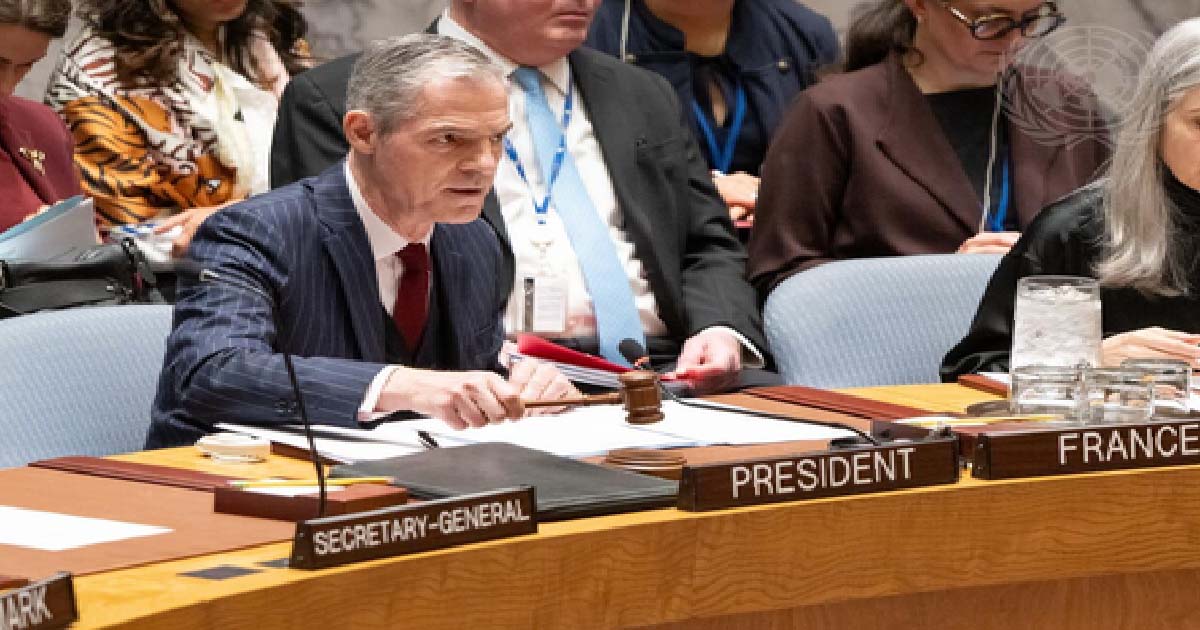
United Nations, April 26: The Security Council has “condemned in the strongest terms” the Pahalgam terrorist attack and urged all countries to cooperate in bringing all those involved in the massacre, to justice.
The members of the Security Council “stressed that those responsible for these killings should be held accountable, and urged all States, in accordance with their obligations under international law and relevant Security Council resolutions, to cooperate actively with all relevant authorities in this regard”, Council President Jerome Bonnafont said in a Press statement on Friday.
A front organisation of the Pakistan-based terrorist group Laskhar-e-Tayiba has owned responsibility for the attack.
The statement issued by France’s Permanent Representative Bonnafont who is the Council president for this month, took a broad view of those involved in the massacre by including the financiers and sponsors.
“The members of the Security Council underlined the need to hold perpetrators, organisers, financiers and sponsors of this reprehensible act of terrorism accountable and bring them to justice”, the statement said.
Pakistan, which is on the Council as an elected member, went along with the other members in endorsing the statement, committing itself – at least on paper – to bringing those involved to justice.
A Press statement expresses the consensus of the Council and carries moral authority, while not being legally binding like a resolution.
The statement also shot down the attempts by some in Pakistan to give terrorist attacks a veneer of justification.
“The members of the Security Council reiterated that any acts of terrorism are criminal and unjustifiable, regardless of their motivation, wherever, whenever and by whomsoever committed”, it said.
The Council members “reaffirmed the need for all States to combat by all means, in accordance with the Charter of the United Nations and other obligations under international law, including international human rights law, international refugee law and international humanitarian law, threats to international peace and security caused by terrorist acts”, the statement added.
Earlier, the spokesperson for Secretary-General Antonio Guterres hinted that a diplomatic effort by him may be afoot.
Asked by a reporter, if Guterres would speak to leaders of India and Pakistan, Spokesperson Stephane Dujarric said that he hoped to have something to share on that later.
Reiterating the condemnation of the terrorist attacks, Dujarric said, “We again urge both the Government of India and the Government of Pakistan to exercise maximum restraint to ensure the situation does not deteriorate further.”
When a reporter asserted that the possibility that “two nuclear countries” might “go to war” was getting insufficient attention, Dujarric said, “I don’t agree with your comment. We are paying very close attention to the situation between India and Pakistan.”
International
Wagah-Attari border closure leaves several families in limbo
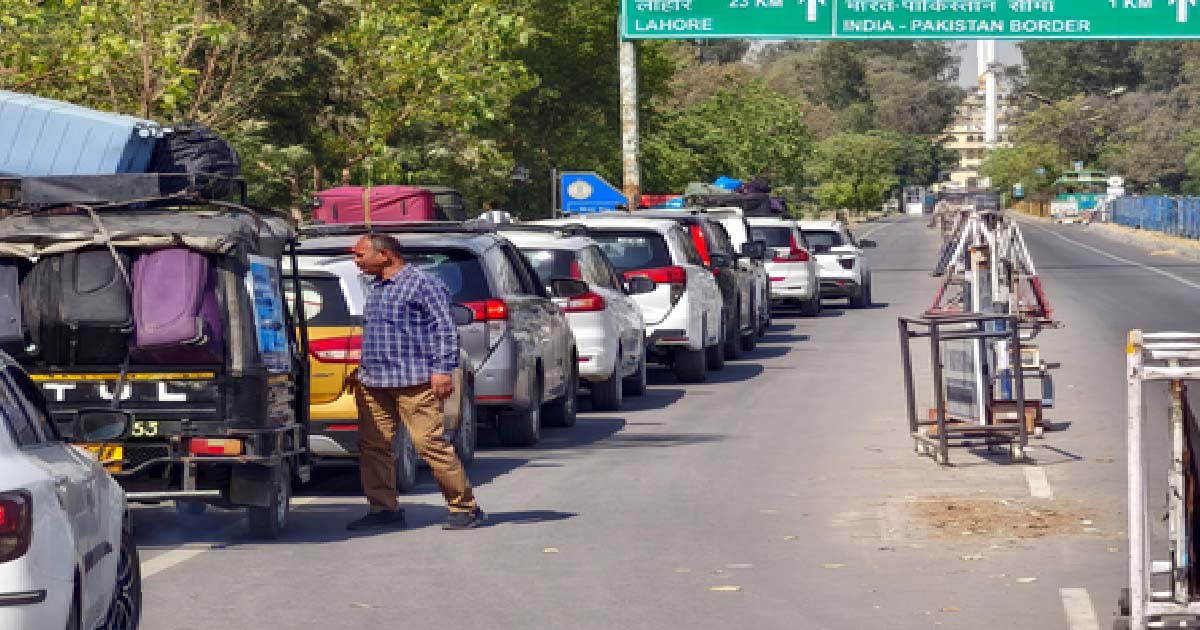
Islamabad, April 25: Pakistan and India’s decision to shut down the Wagah-Attari border crossing after the deadly Pahalgam terror attack has forced several citizens from both countries to cut short their visit and rush back home.
On Thursday, after both countries announced closure of border crossing and gave a deadline for citizens to leave for their respective countries, at least 28 Pakistanis nationals returned from India while 105 Indian citizens in Pakistan crossed over into India.
A Hindu family from Balochistan’s Sibi was reportedly denied entry into India after the closure of border crossing.
“We were on our way to Indore in Madhya Pradesh to attend a wedding. Seven members of our family were excited to join our relatives in India and take part in the celebrations. But upon reaching Wagah, we learned that the border had been sealed. We will spend the night at Dera Sahib in Lahore and head back home tomorrow,” said Akshay Kumar.
Meanwhile, a Sikh family from India, in Pakistan to attend a wedding, decided to leave for India immediately.
“We had come to Pakistan for a wedding. While the ceremony took place, several important rituals remained. Once we heard the border was closed, we decided to return immediately,” said Raminder Singh, an Indian national.
A Hindu family from Ghotki in Pakistan’s Sindh province, now residing in New Delhi, was visiting Pakistan for the last two months to meet their relatives. However, they are now unsure about getting permission to return to India.
“There are five of us, including my young son and daughter, uncle and aunt. We all hold Pakistani passports and were granted No Obligation to Return to India (NORI) certificate by India. But uncertainty looms now, said a family member named Indira.
“Families with cross-border ties often bear the brunt of rising tensions between the two neighbours. With tensions between Pakistan and India once again on the rise, human connections across borders are becoming the first casualty,” said Asif Memood, a Lahore-based journalist.
“The closure of the Wagah-Attari border has left many families in limbo, uncertain when they will next reunite with their loved ones,” he added.
International
Murder of Hindu leader: India slams Bangladesh, says killing follows pattern of systematic persecution of Hindu minorities
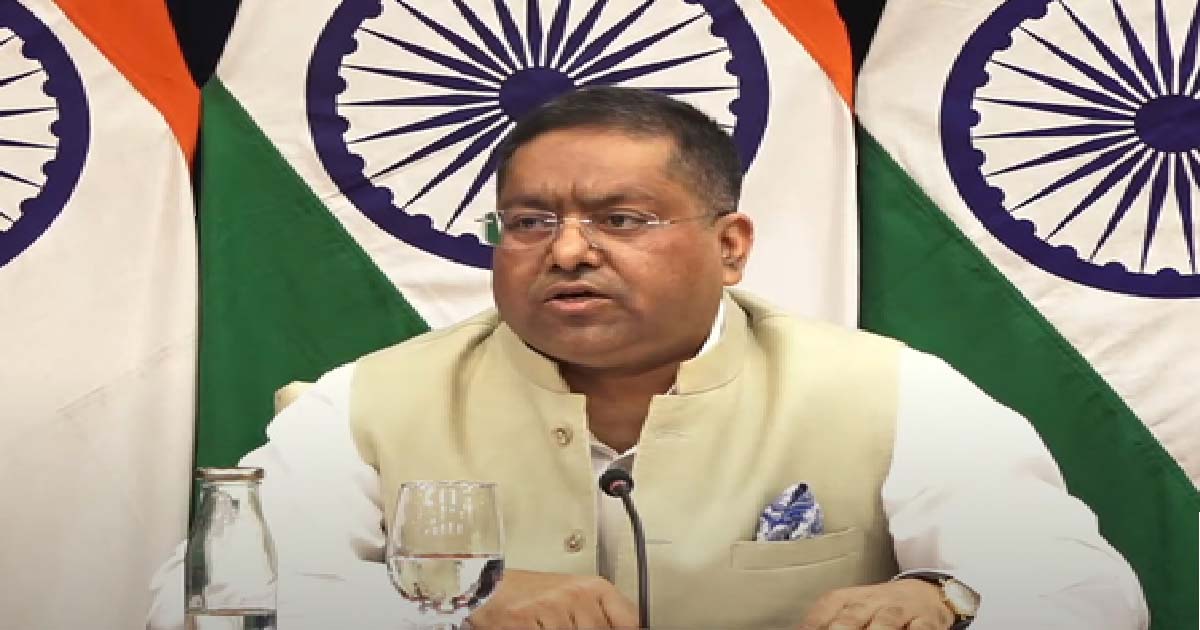
New Delhi, April 19: India on Saturday issued a sharp condemnation of the abduction and brutal killing of Bhabesh Chandra Roy, a prominent Hindu community leader in northern Bangladesh, calling it part of a “pattern of systematic persecution” of minorities under the country’s interim government.
Ministry of External Affairs (MEA) spokesperson Randhir Jaiswal voiced India’s grave concern, stating that the incident reflects an alarming trend of targetted violence against Hindus and other minority groups in Bangladesh.
“We have noted with distress the abduction and brutal killing of Shri Bhabesh Chandra Roy, a Hindu minority leader in Bangladesh. This killing follows a pattern of systematic persecution of Hindu minorities under the interim government, even as the perpetrators of previous such events roam with impunity,” Jaiswal said in a post on social media platform X.
He added, “We condemn this incident and once again remind the interim government to live up to its responsibility of protecting all minorities, including Hindus, without inventing excuses or making distinctions.”
India has previously expressed similar concerns over rising attacks on minorities in Bangladesh, but this latest incident has drawn particular attention due to Roy’s prominence in the Hindu community.
Roy, who served as the Vice-President of the Biral unit of the Bangladesh Puja Udjapan Parishad, was abducted from his residence in Dinajpur district on Thursday evening. According to police and family accounts, he received a phone call around 4:30 p.m., after which four unidentified men arrived on motorcycles and forcibly took him to Narabari village. He was reportedly assaulted and later found unconscious. He was rushed to a hospital in Dinajpur, where he was declared dead on arrival. His wife, Shantana Roy believes the attackers used the call to confirm his location before carrying out the abduction.
Opposition leaders in India also slammed the shocking incident in the neighbouring country.
Congress President Mallikarjun Kharge highlighted that religious minorities, especially Hindus, are being persecuted in Bangladesh.
“Attacks on other religious minorities are also continuing. Recently, the Chief Advisor of Bangladesh made a very condemnable and disappointing comment about the northeastern states of India. The persecution of religious minorities in Bangladesh, human rights violations, and the attempt to erase the memories of the 1971 Liberation War are efforts to weaken the relationship between India and Bangladesh. From 1971 till today, India has always wished for peace and prosperity for all the people of Bangladesh. This is in the best interest of the subcontinent,” he said.
-

 Crime3 years ago
Crime3 years agoClass 10 student jumps to death in Jaipur
-

 Maharashtra1 year ago
Maharashtra1 year agoMumbai Local Train Update: Central Railway’s New Timetable Comes Into Effect; Check Full List Of Revised Timings & Stations
-

 Maharashtra1 year ago
Maharashtra1 year agoMumbai To Go Toll-Free Tonight! Maharashtra Govt Announces Complete Toll Waiver For Light Motor Vehicles At All 5 Entry Points Of City
-

 Maharashtra1 year ago
Maharashtra1 year agoFalse photo of Imtiaz Jaleel’s rally, exposing the fooling conspiracy
-

 National News1 year ago
National News1 year agoMinistry of Railways rolls out Special Drive 4.0 with focus on digitisation, cleanliness, inclusiveness and grievance redressal
-

 Maharashtra1 year ago
Maharashtra1 year agoMaharashtra Elections 2024: Mumbai Metro & BEST Services Extended Till Midnight On Voting Day
-

 National News1 year ago
National News1 year agoJ&K: 4 Jawans Killed, 28 Injured After Bus Carrying BSF Personnel For Poll Duty Falls Into Gorge In Budgam; Terrifying Visuals Surface
-

 Crime1 year ago
Crime1 year agoBaba Siddique Murder: Mumbai Police Unable To Get Lawrence Bishnoi Custody Due To Home Ministry Order, Says Report



